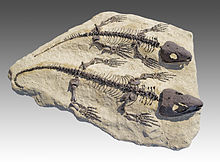大鼻龍科
| 大鼻龍科 | |
|---|---|

| |
| 大鼻龍 | |
無效狀況
| |
| 科學分類 | |
| 界: | 動物界 Animalia |
| 門: | 脊索動物門 Chordata |
| 綱: | 爬蟲綱 Reptilia |
| 演化支: | 真爬蟲類 Eureptilia |
| 科: | †大鼻龍科 Captorhinidae Case, 1911 |
| 異名 | |
| |
大鼻龍科(Captorhinidae)又譯狹鼻龍科,別名杯龍類(Cotylosauria),是最早、最原始的爬蟲類之一。其種類的體長從10幾厘米到超過2米。
敘述
[編輯]
大鼻龍科是一群小型、類似蜥蜴的爬蟲類,存活在晚石炭紀到二疊紀。
與牠們的近親原古蜥科相比,大鼻龍科的頭顱骨還強壯,而牙齒更能處理較硬的植物。大鼻龍科的頭骨寬廣、粗壯、略呈三角形。前上頜骨往下彎。早期種類只有單排端生齒,而較衍化的物種(例如大鼻龍、Moradisaurus)具有多排齒和槽生齒。
大鼻龍科的身體骨骼,仍非常類似早期爬行形類(Reptiliomorph)。在20世紀早期的傳統分類法,西蒙螈形類、闊齒龍形類、以及大鼻龍類,常被認為是最早期的爬蟲類,都歸類於杯龍目(Cotylosauria)。西蒙螈形類、闊齒龍形類目前都屬於爬行形類的早期演化支[1]。
大鼻龍科的尾椎具有特殊裂紋,因此可能有逃生用的斷尾技能,不過並沒有表示其斷尾之後具有彈跳動力;以及再生新尾巴的證據[2]。
發現與研究歷史
[編輯]
早期研究認為Concordia是最原始的大鼻龍類動物。在2006年,一份早期爬蟲類種系發生學研究發現圖林根窗龍是大鼻龍科的姐妹分類單元。因此圖林根窗龍是已知最基礎、最原始的大鼻龍類[3]。之後其他研究也得出類似結果[4][5]。Concordia是唯一生存於石炭紀晚期的大鼻龍類,仍是生存時代最早的大鼻龍類[3]。
大鼻龍科之內有Moradisaurinae亞科。在1982年,A. D. Ricqlès、P. Taquet建立Moradisaurinae亞科,屬於大鼻龍科。Moradisaurinae亞科的定義是:大鼻龍類之內,親緣關係接近Moradisaurus,而離大鼻龍較遠的所有物種。Moradisaurinae亞科的化石發現於中國、摩洛哥、尼日、俄羅斯、美國德州與奧克拉荷馬州[4]。Moradisaurinae亞科被認為是植食性動物,或以昆蟲為食[6]。
在Labidosaurus hamatus的下頜化石上,找到了已知最古老的蛀牙紀錄[7]。
分類
[編輯]- 大鼻龍科 Captorhinidae
- 疑名
- Puercosaurus
- Riabininus
演化樹
[編輯]| 大鼻龍科 |
| ||||||||||||||||||||||||||||||||||||||||||||||||||||||
以下演化樹來自於2011年版本[4]:
| |||||||||||||||||||||||||||||||||||||||||||||||||||||||||||||||||||||||||||||||||||||||||||
參考資料
[編輯]- ^ Goodrich, E.S. On the classification of the Reptilia. Proceedings of the Royal Society of London. 1916, 89B: 261–276. doi:10.1098/rspb.1916.0012.
- ^ LeBlanc, A. R. H.; MacDougall, M. J.; Haridy, Y.; Scott, D.; Reisz, R. R. Caudal autotomy as anti-predatory behaviour in Palaeozoic reptiles. Scientific Reports. 2018-12, 8 (1): 3328 [2020-02-23]. ISSN 2045-2322. PMC 5838224
 . PMID 29507301. doi:10.1038/s41598-018-21526-3. (原始內容存檔於2020-05-04) (英語).
. PMID 29507301. doi:10.1038/s41598-018-21526-3. (原始內容存檔於2020-05-04) (英語).
- ^ 3.0 3.1 Muller, J. and Reisz, R.R. (2006). "The phylogeny of early eureptiles: Comparing parsimony and Bayesian approaches in the investigation of a basal fossil clade." Systematic Biology, 55(3):503-511. doi:10.1080/10635150600755396
- ^ 4.0 4.1 4.2 4.3 Robert R. Reisz, Jun Liu, Jin-Ling Li and Johannes Müller. A new captorhinid reptile, Gansurhinus qingtoushanensis, gen. et sp. nov., from the Permian of China. Naturwissenschaften. 2011, 98 (5): 435–441 [2012-04-08]. PMID 21484260. doi:10.1007/s00114-011-0793-0. (原始內容存檔於2020-04-14).
- ^ 5.0 5.1 5.2 Sumida, S.S.; Dodick, J.; Metcalf, A.; Albright, G. Reiszorhinus olsoni, a new single-tooth-rowed captorhinid reptile of the Lower Permian of Texas. Journal of Vertebrate Paleontology. 2010, 30 (3): 704–714 [2012-04-08]. doi:10.1080/02724631003758078. (原始內容存檔於2020-05-11).
- ^ 6.0 6.1 6.2 The Paleobiology Database: Moradisaurinae. [2012-04-08]. (原始內容存檔於2011-10-04).
- ^ Reisz, Robert R.; Scott, Diane M.; Pynn, Bruce R.; Modesto, Sean P. Osteomyelitis in a Paleozoic reptile: ancient evidence for bacterial infection and its evolutionary significance. Naturwissenschaften. 2011-06, 98 (6): 551–555. ISSN 0028-1042. doi:10.1007/s00114-011-0792-1 (英語).
- ^ Nor-Eddine Jalil and Jean-Michel Dutuit. Permian captorhinid reptiles from the Argana formation, Morocco (PDF). Palaeontology. 1996, 39 (4): 907–918 [2012-04-08]. (原始內容 (PDF)存檔於2012-04-25).
- ^ W. J. May and Richard L. Cifelli. Baeotherates fortsillensis, A New Captorhinid Reptile from the Fort Sill Fissures, Lower Permian of Oklahoma. Oklahoma Geology Notes. 1998, 58: 128–137.
外部連結
[編輯]- Captorhinidae Cladogram
- Concordia Cunninghami, the earliest example Captorhinidae.








